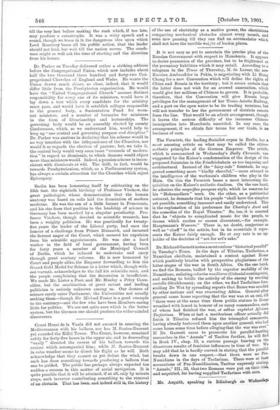• Berlin has been honouring itself by celebrating on the
13th inst. the eightieth birthday of Professor Virchow, the great pathologist, whose demonstration that the human anatomy was based on cells laid the foundation of modern medicine. He was the son of a little farmer in Pomerania, and his rise from that position to the headship of science in Germany has been marked by a singular peculiarity. Pro- fessor Yirchow, though devoted to scientific research, has been a weighty politician. He was practically for twenty- five years the leader of the Liberal party, had once the honour of a challenge from Prince Bismarck, and incurred the fiercest anger of the Court, which secured his expulsion from his scientific appointments. He was also a hard worker in the field of local government, having been for forty years a member of the Municipal Council of Berlin, which he induced to undertake and carry through great sanitary reforms. He is now honoured by Court and people alike, the Emperor forwarding to him the Grand Gold Medal for Science in a letter which, though with- out warmth, acknowledges to the full his scientific rank, and the people complaining that the decoration is insufficient. We made Mr. Lister a Peer, and Mr. Huxley a Privy Coun- cillor, but the combination of great savant and leading politician is entirely unknown among us. Our doctors of science rarely enter Parliament, the Universities not usually seeking them—though Sir Michael Foster is a good example to the contrary—and the few who have been Members caring little for politics. We are not quite sure which is the better system, but the German one should produce the wider-minded discoverers.














































 Previous page
Previous page